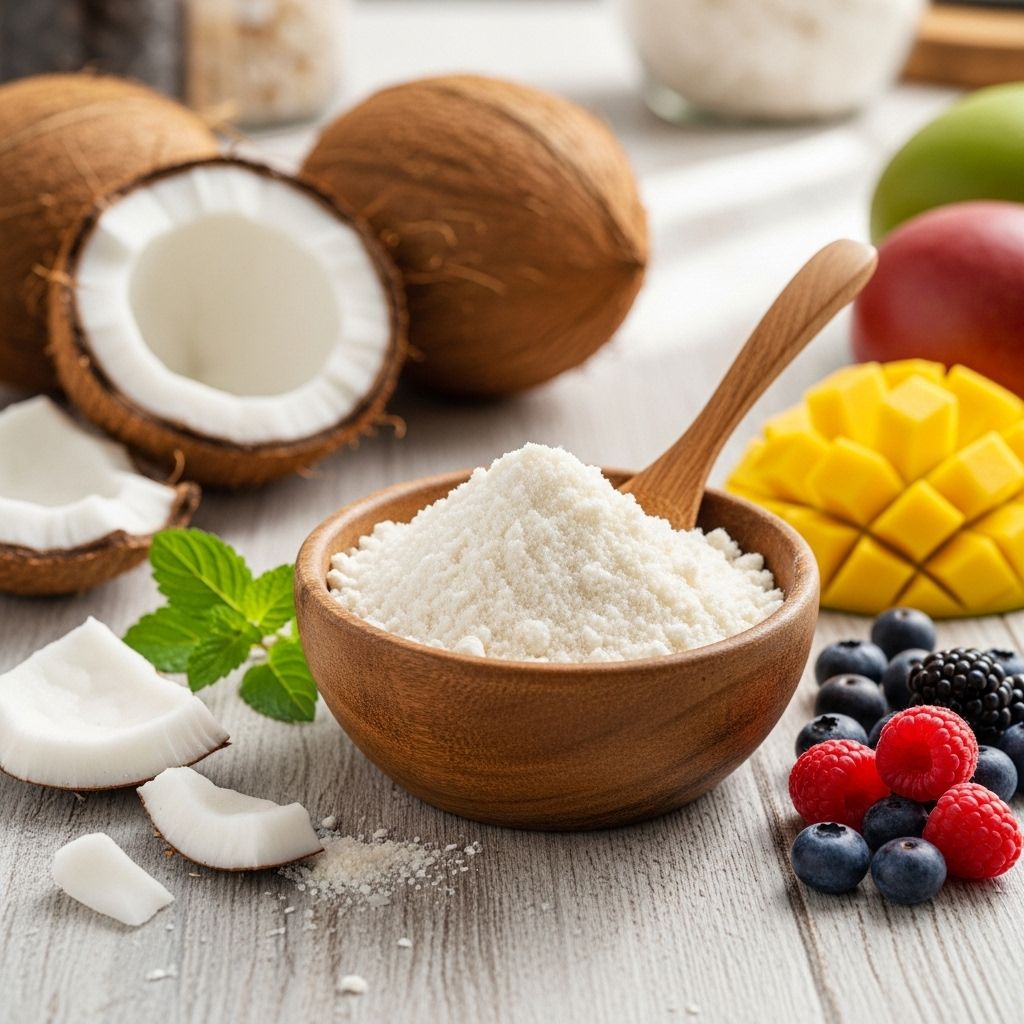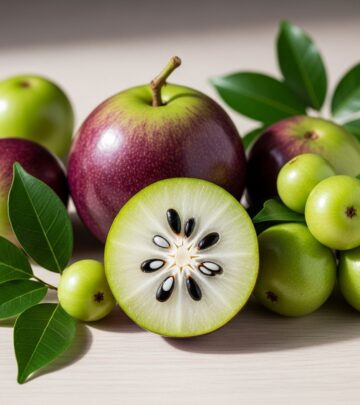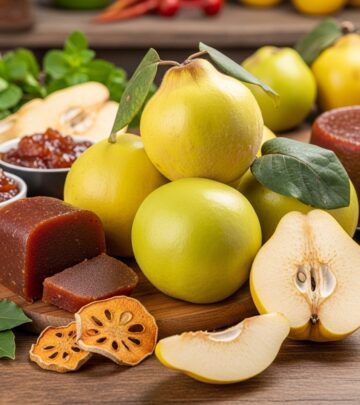Coconut Flour: Nutrition Facts, Health Benefits, and Uses
A grain-free swap that delivers fiber, protein, and healthy fats for better digestion.

Coconut flour has rapidly gained popularity as a nutritious and versatile alternative to traditional wheat flour. Made from dried coconut meat after extracting coconut milk, this gluten-free flour is packed with essential nutrients, making it a favorite among health-conscious individuals and those with dietary restrictions. This guide dives into the nutritional facts, health advantages, culinary uses, potential side effects, and frequently asked questions about coconut flour.
What Is Coconut Flour?
Coconut flour is a fine, white powder produced from the by-product of coconut milk extraction. Once the coconut milk is separated, the remaining coconut meat is dried and ground into flour. This process yields a naturally gluten-free, high-fiber, and low-carb flour suitable for various cooking and baking applications. Coconut flour is beloved for its subtle coconut flavor and unique ability to absorb liquids compared to other flours.
How Is Coconut Flour Made?
- Extraction: Coconut milk is pressed from fresh coconut meat.
- Drying: The fibrous coconut pulp left after extraction is thoroughly dried.
- Grinding: The dried pulp is finely ground into a soft, white flour.
Coconut Flour Nutrition Facts
Coconut flour stands out for its high dietary fiber and beneficial nutrient content, providing significant advantages over common grain-based flours:
| Nutrient (per 15g serving) | Amount | % Daily Value (DV) |
|---|---|---|
| Calories | 50 kcal | – |
| Carbohydrates | 8 g | 5% |
| Dietary Fiber | 6 g | 23% |
| Total Fat | 3 g | 5% |
| Protein | 2 g | – |
| Iron | 1.08 mg | 6% |
| Potassium | 200 mg | 6% |
| Sodium | 15 mg | 1% |
| Saturated Fatty Acids | 3 g | 14% |
Compared to wheat flour, coconut flour delivers more fiber, protein, healthy fats, and essential minerals such as potassium and iron, while remaining low in digestible carbohydrates and calories.
Health Benefits of Coconut Flour
Incorporating coconut flour into your diet offers a spectrum of impressive health benefits:
1. Rich in Dietary Fiber
- One of coconut flour’s standout features is its high fiber content, contributing up to 36% of the daily value in just a quarter-cup serving.
- Fiber adds bulk to stools, supports digestive regularity, and may aid in preventing constipation.
- As a prebiotic, coconut flour promotes the growth of beneficial gut bacteria.
2. Supports Stable Blood Sugar Levels
- The low carbohydrate and high fiber makeup of coconut flour slows the absorption of sugar into the bloodstream, helping to maintain balanced blood sugar levels.
- Its low glycemic index and load make it an ideal choice for people with diabetes or those managing insulin sensitivity.
3. Aids in Weight Management
- Coconut flour is both filling and low in calories, allowing you to feel satiated for longer without overeating.
- The combination of fiber and protein supports appetite control and may reduce overall calorie intake during meals.
4. Gluten-Free Alternative
- Being naturally free of gluten, coconut flour is safe for individuals with celiac disease or gluten intolerance.
- Its use in baking and cooking enables a wider range of dietary options for those with wheat allergies or sensitivities.
5. Improves Heart Health
- Regular intake of coconut flour may help reduce cholesterol and triglyceride levels due to its fiber and healthy fat content.
- Potassium in coconut flour supports healthy blood pressure regulation, promoting overall cardiovascular well-being.
6. Aids Digestive Health
- High levels of insoluble fiber promote regular bowel movements and may protect against gastrointestinal disorders.
7. Potential Cancer Prevention
- Research suggests that the soluble and insoluble fibers in coconut flour may decrease the risk of colon cancer by promoting optimal digestive conditions and reducing toxins.
8. Enhances Skin Health
- Coconut flour contains lauric acid, a fatty acid known for its antimicrobial and skin-supporting properties, which may help reduce acne and inflammation.
9. Boosts Metabolism
- The medium-chain triglycerides (MCTs) in coconut flour are easily metabolized for energy and may aid in fat burning and overall energy expenditure.
Culinary Uses of Coconut Flour
Coconut flour’s unique texture and absorption properties make it a versatile ingredient in both sweet and savory recipes. Here are some of the most popular ways to use coconut flour:
- As a gluten-free baking flour in cakes, muffins, cookies, and bread.
- Added to pancakes, waffles, and crepes for fiber-rich breakfasts.
- As a thickener in soups, curries, and sauces.
- For breading proteins like chicken or fish for a low-carb alternative to traditional flour or breadcrumbs.
- In smoothies, yogurt bowls, or protein bars to boost fiber and nutrition.
Baking with Coconut Flour: Key Tips
- Coconut flour is highly absorbent; a small quantity goes a long way. Typically, replace 1 cup of regular flour with about 1/4–1/3 cup of coconut flour.
- Recipes with coconut flour often require extra eggs or liquid to achieve the right texture.
- Mix coconut flour doughs and batters thoroughly to ensure even hydration.
- Combining coconut flour with almond flour can yield better structures and moisture balance in gluten-free baked goods.
Potential Side Effects and Considerations
- Because of its high fiber content, introducing too much coconut flour too quickly may cause digestive discomfort in sensitive people.
- Gradually add coconut flour to your diet alongside adequate fluids to minimize bloating or gas.
- People with tree nut allergies generally tolerate coconut, but check with a healthcare provider if unsure.
How to Store Coconut Flour
- Store in an airtight container in a cool, dry place away from sunlight.
- For extended freshness, refrigerate or freeze coconut flour, as its high fat content can make it prone to spoilage.
- Always check for off odors or clumping, which may indicate spoilage.
How Does Coconut Flour Compare to Other Flours?
| Flour | Gluten-Free | Fiber Content | Carbohydrate Content | Common Uses |
|---|---|---|---|---|
| Coconut Flour | Yes | Very High | Low | Baking (cakes, breads), thickening |
| Almond Flour | Yes | Moderate | Moderate | Baking, coatings |
| Wheat Flour | No | Low | High | Baking, general cooking |
| Oat Flour | Depends (often) | High | Moderate | Baking, pancakes |
| Rice Flour | Yes | Low | High | Noodles, baking |
Frequently Asked Questions (FAQs)
Q: Can coconut flour be substituted 1:1 for wheat flour?
A: No. Coconut flour is far more absorbent than wheat flour. Use about 1/4 to 1/3 cup of coconut flour for every 1 cup of wheat flour, and add extra eggs or liquid as needed for proper consistency.
Q: Is coconut flour suitable for keto or low-carb diets?
A: Yes. Its low net carbohydrate content and high fiber make it ideal for keto, paleo, and other low-carb diets.
Q: Does coconut flour taste strongly of coconut?
A: It has a slightly sweet, mild coconut flavor that can complement many recipes without overpowering them.
Q: Can people with nut allergies eat coconut flour?
A: Coconut is botanically classified as a fruit, not a true nut, so most people with tree nut allergies can safely consume coconut flour. However, consult an allergist if uncertain.
Q: Is coconut flour healthier than almond flour?
A: Both have unique benefits: coconut flour is higher in fiber and lower in fat and calories; almond flour is richer in protein and vitamin E. Choice depends on dietary needs and preferences.
Q: What is the best way to store coconut flour?
A: Keep coconut flour in an airtight container in a cool, dry place, or refrigerate/freezer for longer shelf life.
Key Takeaways
- Coconut flour is a gluten-free, nutrient-dense alternative to traditional flours.
- It is rich in dietary fiber, healthy fats, and essential minerals like iron and potassium.
- Including coconut flour in your diet can support digestive and heart health, help manage weight, and maintain stable blood sugar levels.
- Its high absorbency requires recipe adjustments, especially in baking, for best results.
References
- https://rotimatic.com/blogs/food-health/coconut-flour
- https://www.medicinenet.com/coconut_flour_nutrition_benefits_and_more/article.htm
- https://draxe.com/nutrition/coconut-flour-nutrition/
- https://www.healthline.com/nutrition/coconut-flour
- https://www.bbcgoodfood.com/health/nutrition/health-benefits-coconut-flour
- https://plantx.com/blogs/vegan-blogs/coconut-flour-its-benefits-facts-and-uses
- https://www.digestivediseaseny.com/blog/benefits-of-coconut-flour
- https://nutritionstripped.com/food-index/coconut-flour/
- https://pmc.ncbi.nlm.nih.gov/articles/PMC8347958/
Read full bio of Sneha Tete













